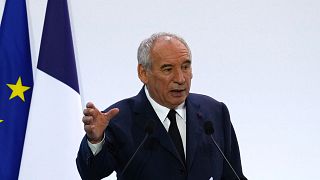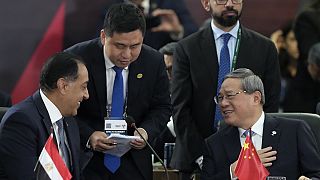Egypt
Brands such as Zara, Adidas, Nike and Marks & Spencer are out of reach for many Egyptians but a store in one of Cairo’s lower income districts is making these products more affordable.
Some of the customers say ‘Kilo Stock’ sells clothes by the kilogram, trading garments at relatively inexpensive prices compared to what they would have cost at the brand shop itself.
Customer, Heba, was so pleased with her experience, she described the prices and variety as unimaginable.
When I first came here, I had heard about the ‘clothes per kilo’, and wanted to come see what it was and what prices were like. I came here and found that prices were really good, that there were brands with unimaginable prices,” she added.
She recommends that people come and shop at the store because of its affordability.
“(Buying) something used and comparing its price to something new is different from buying something new that carries a brand, with a price that is lower than that in the brand shop. For example, you can buy a piece by a brand for 80 Egyptian pounds ($4.61), it can be good quality and a fancy brand, “ said another customer, Ahmed.
Egyptians are battered by years of IMF-backed austerity measures and rising food prices.
Customers at the store browse through the clothing on display then take them to a scale at the cashier’s desk, where they weigh the clothes to know how much the pile would cost.
Kilo Stock manager, Gaber Reda said the garments are all of great quality, with no flaws whatsoever.
“(Here you can find) something that is unused, that has not been washed or worn. Something new, brand new. But of course, products from the Wekala (popular street market in Cairo) can be used, worn, or even stained. These, however, are the surplus of European shops.
They arrive with their own tags, they are original,” he explained.
Egypt is committed to the reforms under a $12 billion IMF loan deal agreed in 2016 and aimed at attracting foreign investment.
Under the programme, the government devalued the currency and has been gradually cutting fuel subsidies, putting tens of millions of Egyptians under strain as costs of living rises.













02:20
France: Avignon Festival celebrates Egyptian diva Umm Kulthum
01:42
Gaza conflict overshadows EU-Southern Neighbourhood talks in Brussels
01:05
Ethiopia's mega-dam on the Nile is "now complete", Prime Minister says
00:55
Summer Davos 2025 closes with focus on AI, China’s economy, and global innovation
01:09
Egypt: Inflation forecast to have climbed further in May
01:05
U.K-Egypt: Mother of jailed activist hospitalised amid hunger strike